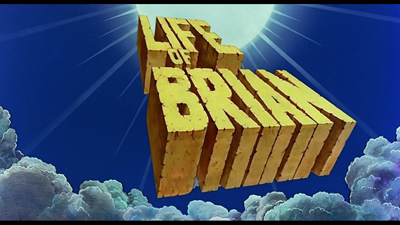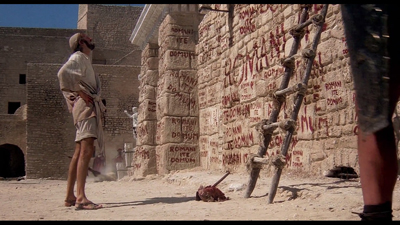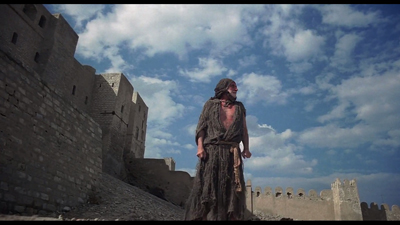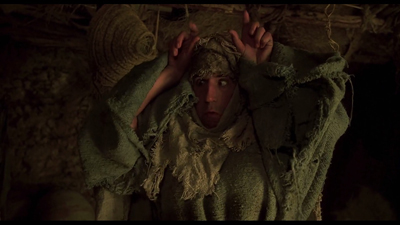Part One
[As is the way of things, this piece has been delayed by a few months. My original intention was to post each of the four parts on the 40th anniversary of the original UK cinema release of each of the four films, but other things rather got in the way.
I’m now intending to post the four parts between now and mid-December, so I at least finish the whole piece by the end of 2019.] {Which I have now failed to do, but Moonraker is coming soon…}
First, an Introduction:
Born in 1967 (a Summer of Love birth; A Whiter Shade Of Pale was at number 1) I spent my early childhood in Knockholt, a tiny administratively-liminal village on the North Downs in Kent (about which the most interesting facts are the derivation of its name – āc-holt meaning oak copse – and that Aleister Crowley lived there for a couple of years, indeed I’m convinced that he and his acolytes performed occult rituals at the creepy Victorian mansion where I attended day nursery as a three-year-old).
My earliest cinema memories – from the early 70s – are going with my second day nursery to watch Disney movies (including Bambi and Robin Hood) as well as Chitty Chitty Bang Bang (all re-releases) and Diamonds Are Forever on its first release (which I can only assume the nursery teachers were desperate to see; its ‘A’ certificate making this possible). So began a life-long love affair with Bond (though we’ve fallen out somewhat during the Craig era).
It subsequently became a family tradition for my father to take me and my younger brother to each new Bond film during the first week of release.
We moved to Tory heartland Sevenoaks (oaks again) so that in 1978 I could attend Sevenoaks School, the private school to which I’d won a free place (as a “day boy”) via the eleven-plus. The school’s coolest alumni are Adam Curtis (he of masterpieces HyperNormalisation and Bitter Lake) and Charlie Higson. Daniel Day Lewis also attended, but didn’t like it and left after two years.
By the summer of 1979, I had completed my first year, replete with all the public school clichés of sadistic sports masters and continual bullying (exacerbated by me hating sport and being both a chorister and player of the violin).
The music opportunities were myriad and welcome and the school’s music centre had a vinyl listening library that featured mostly classical music but had a single copy of Dark Side Of The Moon (1973) which must already have been played thousands of times by the autumn of 1978.
Convinced that I wanted to stay at Sevenoaks School, but still suffering the effects of the negative aspects, the summer of 1979 arrived not a moment too soon. Between June and November that year I saw four films on their original UK cinema release which I now realise have shaped me more than any other before or since . This due to both the power of cinema (as separate from the power of film) and the stories and themes of these four films.
I became very tall very young and by 12 I could already pass as 14. I was lucky that the then manager of the Sevenoaks Odeon could see that I was a neophyte cineaste and he obviously took the decision (a decision that it would now be impossible to take for someone in his position) that I should be let into pretty much any film that I wanted to see (though ‘X’ certificate films were a challenge early on – more of this anon).
Originally built in the 1930s as The Majestic, the Sevenoaks Odeon (now the Stag Theatre) was a glorious 1360-seat theatre, which was converted into 3-screen cinema in the early 1970s. This was of course in the days of the magic of analogue projection and those brilliantly naff ads for local businesses that the Boomer generation so brilliantly lampooned, from Alexei Sayle’s Stuff to the classic “within throwing-up distance of your local” Not The Nine O’Clock News sketch (I began watching NTNON at its launch in October 1979 after a fairly forthright, but thankfully short, argument with my mother).
This was also the era of original horror shorts shown before horror features. Some of my deepest memories are of these brilliantly macabre and shocking short films – often based on urban legends. I’m sure someone’s written a thesis about them and at some point, I’ll actually find the time to search it out.
The key aspect of my psychological development in terms of themes and genre has always been an interplay between TV and film. By 1979, rich and fertile ground had been ploughed across the comedy, horror and thriller genres with shows/stories like Doctor Who: The Sea Devils (one of my very first TV memories from 1972), virus thriller Survivors (BBC, 1975 – 1977), The Goodies and Monty Python’s Flying Circus. On radio (though actually on cassette tapes shared by a school friend) The Hitchhiker’s Guide To The Galaxy (1978) and on vinyl (though again, avidly consumed on cassette tapes from the same friend) all the Python albums up to and including 1975’s Grail.
But 1979 was the year I started going to the cinema regularly on my own, irrespective of the film’s certificate. Thousands of films later, it’s a bug that I have yet to get out of my system.
This intense and compact movie-going period between June and November 1979 was bookended by two momentous events with far-reaching consequences. The first was Thatcher’s election victory in May 1979 – a seismic social and political shift. This was magnified by my parents (one a professional singer, the other worked in the NHS) who both had a justifiable loathing of the Tories in general and Thatcher in particular. The second seismic event – which I will come to in due course – provided perfect polarity, being both intensely personal and deeply psychological.
So, let’s begin with:
MONTY PYTHON’S LIFE OF BRIAN

Original UK cinema release thursday, 8th November 1979.
‘AA’ certificate, for which I was two years underage. I saw this with my father, who also loved the Pythons. I’m convinced my late younger brother was there also, though that would have made him four years too young, so he won that one. He loved the Pythons too.
From the John Barry-esque falling major third of the title song, through the truly-bizarre Welsh strand, to the final recommendation to see La Notte “If you enjoyed this film…” (and I wasn’t happy till I had), Life Of Brian is one of my favourite movies in any genre.
Watching it again for this post, what really stands-out is the Pythons’ forensic dismantling of the accumulated absurdity and crass mindlessness of the institutions that define the British state and its establishment masters. This is a film that takes aim at far more targets than organised religion alone. At every level, from Imperialist state to terrorist cell, Brian takes unalloyed joy in undermining entirely unearned and unjustified authority, challenging you to question its motives, its assumptions and its mechanisms of self-protection and self-perpetuation.
These ideas would find more strident and overt lines of attack in 1983’s The Meaning Of Life (think of the stunning match-cut of Jones’s mud-caked public-school rugby player to his trench-sodden WWI soldier), but in Brian they are more subtle and under-played.
For an impressionable 12-year-old on the edge of puberty, at once becoming politically aware for the first time and dealing with the contradictions inherent in the blunt-force sadism and exceptional intellectual stimulation of (an admittedly progressive) public school this was philosophical and satirical rocket fuel. Fold-in the fact that I’d already done a year of Latin (I would go on to scrape a ‘C’ at ‘O’ Level) and you have the perfect audience member for the Pythons’ masterpiece.
How could anyone take the absurdity of English institutions seriously? And these six geniuses – who I already worshipped – were giving me licence to mock, undermine and deconstruct every institution that dared to ignore, frustrate or marshal me.
Four key themes:
1. The absurd and gormless dogmatism of organised religion.
“You don’t need to follow me! You don’t need to follow anybody!” The most overt of the four is a brutal dismantling of the arbitrary inanities, unquestioned conventions and murderous blindspots of religion. This is most succinctly articulated by Mrs. Cohen as she and Brian make their way to the stoning: “It’s written, that’s why!”. It’s also highlighted by the High Priest’s apoplectic “Blasphemer!” and by the wonderful moment when Charles McKeown’s blind man is knocked down by the crowd pursuing Brian after his inconclusive propheting. He may be blind, but they’re all blind.
This is clearly the most obvious of the four I’ve chosen, but forty years on its still mind-boggling just how sharp and brutal Brian is on this. It’s little wonder that the “Bloody C of E!” decided to decry the film to the extent that it did, irrespective of the fact that they chose to use an attack on the person of Jesus Christ our Lord and Saviour (how many “Brians” are in the title song alone? There are fourteen, I counted them), as their key charge (if they’d simply acknowledged and confronted Brian’s merciless attack on dogma, they wouldn’t have had a leg to stand on).
But even this is deliciously undercut by the Pythons, as ‘Prophets Alley’ is very clearly a joke at their own expense: prophets, they imply, are the same as comedians, espousing surreal notions and telling impossible stories for the entertainment of the crowd.
2. The absurd and casual cruelty of British institutions.

The speed with which Cleese’s Centurion of the Yard goes from ear-pulling to drawing his sword will be instantly recognisable to many a public schoolboy. “Now write it out a hundred times!” is a classic/al public school punishment – at once humiliating and pointless.
There’s almost no British institution that doesn’t come in for ridicule: the Church (“An unbeliever! Persecute! Kill the heretic!”), unions (“What have the Romans ever done for us?”; “Right, this calls for immediate discussion! … Completely new motion!”), the civil service and bureaucrats in general (“Out of the door. Line on the left. One cross each.”), the army/police (“Oh, and er thwow him to the floor, Sir?”; an entire centuria failing to find anyone in Matthias’s house; “Now don’t do it again!” when Brian has just finished doing “it” a hundred times), as well as deeply ingrained hierarchies of class and race (“A Samaritan? This is supposed to be a Jewish section!”).
Politics is also viciously deconstructed from despotic authoritarians (the vain and totally un-self-aware Pilate) to a hard left that genuinely thinks “the entire apparatus of the Roman Imperialist state” can be dismantled in two days, but would ultimately rather maintain ideological purity and argue among itself than risk its cosy existence by actually fighting the power in a rational, effective and non-counter-productive way (“Splitter/s!”; “Sanctimonious bastards!” as Brian shouts from his cross at the end).
3. The absurd and unstoppable stupidity of people.
“Brothers, brothers, we should be struggling together!” “We are!” Beginning with the escalating bickering (both intra couple and between couples) at the Sermon on The Mount and ending (a perfectly circular narrative strand) with the very same people: Palin’s Samaritan Mr. Big-Nose and wife (Gwen Taylor); Terence Bayler’s upper-class Jew and wife (Cleveland); Idle’s Cockney Jew Mr. Cheeky, all still arguing as they hang from crosses (in punishment for the fight from the Sermon scene), there are myriad examples throughout of the sheer unbridled idiocy of human beings.
“How shall we fuck off, oh Lord?” and the Judean People’s Front Suicide Squad are also prime examples. Indeed, my favourite line of the entire film has always been Reg’s “Oh, peace?! Shut up!”
Brian addresses the issue of divide and conquer/rule head on: the almost complete inability of the oppressed to identify their common enemy and concentrate their fire-power on it (as happens for example in the archetypally-idealised Star Wars: Episode IV). If people weren’t so intent on arguing and fighting with each other (“And Swedish separate from Welsh!”), they wouldn’t be so easy to manipulate and control.
“Nail ’em up, I say! Nail some sense into ’em!” says Palin’s Ben, who could be any adherent of far-right populism in any country worldwide in 2019. Indeed, Ben is a truly brilliant example of the “Stockholmed citizen”, totally in thrall to the powers that are torturing him, and blaming everyone but himself and those powers for his pain and inconvenience. “Oh, well. One born every minute.” as Harry the Haggler says.
The weak identify with the strong in order to feel powerful, but end-up supporting those who would abuse and murder them. Reg’s “It’s the meek who are the problem.” really nails this, so to speak, albeit that Reg has no clue how properly to mobilise the PFJ, let alone the meek. “There’s no pleasing some people.” as Brian says to the Ex-leper. “That’s just what Jesus said, Sir!”
4. The absurd and joyous paradox of life itself.
“Yes, we’ve got to work it out for ourselves!”. This paradox is, of course, most perfectly epitomised in Idle’s final song as ‘sung’ by Mr. Frisbee III with Mr. Cheeky’s overdubbed voice, which requires no further comment, but there are also many other examples.
Brian’s fatally delayed coming-of-age moment, including finally getting his end away but also being crucified, is another perfect example – there is literally no joy without pain and no life without death. Psychologically, this is also a good example of “The frustration of archetypal intent” (Anthony Stevens’s application of Jung’s theory of individuation): Brian’s sadistic/smothering mother has arrested his development, and in so doing has ensured that he meets an untimely end when he finally breaks free of her.)
Notice also how the title song artfully highlights this paradox as its lyrics take Brian from “The babe they called Brian.” to a “A man called Brian!”, when psychologically he’s no such thing as the story starts.
Four favourite moments/elements:
Gilliam’s sci-fi short smashing into the film’s Midpoint in exactly the same way that The Crimson Permanent Assurance invades The Meaning Of Life a few years later (something also highlighted in the brilliant Rule Of Three podcast episode on Brian).
The music suddenly transforms into sub-John Williams and an entire story is played-out without any dialogue, again highlighting Gilliam’s mastery of the visual. Plus, the yellow proto-space shuttle hurtling back to earth is a gorgeously synchronistic link to the first (chronologically) of my four films (to be revealed in due course, though film buffs will already have guessed what it is).
I’ve always wondered what this scene is about. With the profusion of fake and misidentified prophets on display in Brian and the fact that it’s known the Pythons exhaustively researched the historical period and all the theories pertaining to it, I do wonder whether there’s a subtle nod here to the “alien intervention in human history”, “miracles can be explained by alien technology” and “the Earth has always been caught between warring alien races” theories (and, of course, a mercilessly sceptical undermining of all of these).
“He’s been taken up!” as Idle’s follower later exclaims. Hard to argue with that, even though a moment later Cleese’s follower spots Brian: “No. There he is. Over there.”
Spike Milligan’s glorious 80-second cameo has always been one of my favourite moments, but I now realise this is because I am at heart a “Milliganist” when it comes to organised religion and any form of proselytising. Indeed, I have failed sophisticated HR recruitment days at this very hurdle because I literally cannot be arsed to talk people around to my point of view, even when I know I’m right. Like Milligan, once everyone else has run off after Brian, I’ll try once half-heartedly then turn and walk away, never to return. Life’s just too fucking short.

“Leave that Welsh tart alone!” The extreme (yet surreal) transgression of Terry Jones as Brian’s mother Mrs. Mandy Cohen, a character that remains just as shocking now as it was in 1979. As evidenced by:
The vicious slaps she delivers to Brian as both infant (at the end of the manger scene: “Shut up!”) and adult (just after he’s slept with Judith, thus finally freeing himself of his mother, but too late).
The moment when she kneels down to service the Roman officer… (and… CUT).
The pitch-perfect characterisation/performance when she rearranges her headscarf when the crowd starts “Hailing” her as the Messiah’s mother.
The expression of utter disbelief that animates her face when confronted with Judith stark naked.
And finally, the beautifully-circular and deeply ironic line: “To think of all the love and affection I’ve wasted on you!”. Brian is literally abandoned by everyone except his new-found family of crucifixion victims, all of them ultimately willing to “look on the bright side of death”. There’s a mordant beauty to that.
And these don’t even include what would now be the most contentious line in the entire film (it arrives soon after “He was a Centurion in the Roman army…”)
As a sometime screenwriter I want to highlight a few moments, which show just how brilliant the Pythons were at feature writing:
When Mrs. Cohen decides that a “balm” “might bite him [infant Brian]” because “That’s a dangerous animal… It’s great big… [horns].” When she’s challenged by Palin’s Third Wise Man regarding this patent absurdity she replies “Well, there is an animal called a ‘balm’. Or did I dream it…?”
This is expert foreshadowing/subtext, for what is Life Of Brian – and indeed all cinema – but a (fever) dream in which words have multiple meanings and the sacred becomes the profane, while the basest elements are illuminated? But it’s also a story about a nonsensical subjective reality that is created entirely by the characters within it: that Brian is the messiah. This is the entire film and its ideas distilled into one moment. It’s a truly great example of how to do this with minimum observed effort (see also the opening of The Wild Bunch, which I do tend to bang on about).

Almost immediately after this, Mrs. Cohen is at it again, when she decides that Capricorns are all Messiahs and has to be disabused of this nonsense by Chapman’s Second Wise Man. “Oh, I was going to say. Otherwise there’d be a lot of them!” she responds. Again, this is beautifully-crafty foreshadowing, for what is Brian about if it’s not about there being “a lot of them” (at least from the perspective of the idiots who need someone to follow).
Then there’s upside-down-prisoner’s (Ben’s) “They must think you’re Lord God Almighty!”. The subtext here is so brilliantly overt – yet so hidden in both conflict and humour – that it’s easy to miss just how clever this line is. Again, this line is the film’s story in microcosm.
Finally, the brilliant exegesis on narrative suspense at the end of Brian’s improvised propheting “…To them only shall be given… to them only… shall be given…” Always leave them wanting more, but if they’re really hooked they may well insist on more straight away.
Coda:
You could probably sum-up Brian’s ur-theme with Timothy Leary’s famous exhortation from How To Operate Your Brain: “To think for yourself you must question authority and learn how to put yourself in a state of vulnerable open-mindedness, chaotic, confused vulnerability to inform yourself.” Otherwise known in its shorter version: “Question authority; think for yourself.” With “mock” as an implicit and consequent part of said questioning.
As when the crowd is laughing hysterically at Pilate and Biggus Dickus, there is sometimes no better way to respond to authoritarians than to laugh at them (as any fan of political comedy and satire can attest). Otherwise you get nothing but group-think: “Yes, we are all different!”
Spending one’s entire adult life questioning authority can be a lonely, depressing and poverty-stricken path, but, hey, you can’t fight City Hall! (And by City Hall I mean, of course, the innate core of one’s psyche).
“Bloody Romans!”
Oh, and finally I must mention my favourite pun in the whole film: “So your father was a Woman? Who was he?” (No, but his ‘mother’ is a ‘man’.)
You could argue that Brian – for all his naivety, earnestness, stunted growth and bad luck – is indeed a “lucky bastard”, for who else in Judea A.D. 33 got to ride in a space ship?
Next up, the second of the Four Films That Made Me: Moonraker (1979), in which Bond gets to do the same…
